

by Editor
Let's consider types of proxies: residential, mobile, and server proxies. Distribution methods include individual and shared. We'll delve into protocol operations, examine spam lists, and test 4 popular services using Gmail as an example. Based on this, you'll be able to understand and determine which proxies are right for your needs.
We’ll be testing the services Astroproxy, Lunaproxy, Proxylane, and Ake. I’ll, whenever possible, use 2 geo-proxies from the Netherlands and Belarus. To maintain experimental integrity, I’ll be farming in 2 browsers: Dolphin and Octo.
For testing, I’ve chosen 4 different services across various price ranges:
- 2 services that provide an unlimited amount of traffic for residential proxies are Luna Proxy and Proxy Lane;
- 2 services that provide proxies with traffic-based billing and the ability to change IP are Ake and Astro proxy. The price difference for these proxies is approximately double.
For this experiment, I’ve developed a unique weekly farming scheme. The accounts won’t be used for shady or gray activities; only for personal use, hence bans/disables due to poor farming/spam, etc., are excluded. To check fingerprint, IP, GEO, and spam lists, I’ll use Pixelscan.net.
This isn’t a review of proxy services; I won’t be examining the interface, support, and other categories. Also, please note that 2 proxies are insufficient to draw any conclusions about the overall service quality.
Proxy server
It’s an intermediary server that acts as a mediator between the client and the target server. The proxy server receives a request from the client, forwards it to the target server, and then returns the response to the client.
Types of proxies:
- Residential proxies are proxy servers located in the same physical location as the client. They provide higher speed and reliability than other types of proxies but can also be more expensive.
- Mobile proxies are proxy servers located on mobile devices such as smartphones or tablets. They provide a high degree of anonymity but can be less stable than other types of proxies.
- Server proxies are proxy servers located on dedicated servers.
|
Characteristic |
Mobile proxies |
Residential proxies |
Server proxies |
|
Anonymity |
High |
Medium |
Medium |
|
Speed |
Medium |
High |
High |
|
Reliability |
Medium |
High |
High |
|
Cost |
Low |
Medium |
High |
|
Accessibility |
Low |
High |
High |
Individual and shared proxies:
- Individual proxies are proxy servers used by only one user. They provide maximum confidentiality and security but can be more expensive than shared proxies.
- Shared proxies are proxy servers used by multiple users. They offer a lower cost compared to individual proxies but may be less secure.
|
Characteristic |
Individual proxies |
Shared proxies |
|
Ownership |
Used by only one user |
Used by multiple users |
|
Anonymity |
High |
Medium |
|
Reliability |
High |
Low |
|
Speed |
Medium |
Low |
|
Cost |
High |
Low |
Http and Socks:
|
Characteristic |
Socks 5 |
HTTP |
|
Protocols |
HTTP, FTP, SSH, Telnet, SMTP, POP3, IMAP, IRC and others |
HTTP |
|
Security |
Insecure |
Secure |
|
Speed |
Fast |
Slow |
|
Anonymity |
High |
Low |
|
Price |
Low |
High |
- HTTP proxies are proxy servers that support only the HTTP protocol. They are used to access websites and other resources that use HTTP.
- Socks proxies are proxy servers that support a wide range of network protocols, including HTTP, HTTPS, FTP, SSH, and others. They are used to access various network resources.
Proxies in spam lists are proxy servers that have been blocked because they were used for sending spam. Spam lists are databases that contain information about proxy servers that were used for spam distribution.
Static and dynamic IPs:
- Static IPs are the IP addresses that don’t change over time. They are typically used for servers and other devices that need to be constantly accessible.
- Dynamic IPs are the IP addresses that change over time. They are usually used for home computers and other devices that don’t need to be constantly accessible.
|
Characteristic |
Dynamic proxies |
Static proxies |
|
IP-address |
Changes over time |
Doesn’t change over time |
|
Anonymity |
High |
Low |
|
Price |
Low |
High |
IPv4 and IPv6:
- IPv4 is an outdated protocol for assigning IP addresses. It has a limited number of addresses, leading to problems with address exhaustion.
- IPv6 is a new protocol for assigning IP addresses. It has significantly more addresses than IPv4, solving the issue of address exhaustion.
Differences between IPv4 and IPv6:
|
Characteristic |
IPv4 |
IPv6 |
|
Number of addresses |
Limited |
Large |
|
Subnet mask |
24, 32, 16, 8 |
64 |
|
Address length |
32 bits |
128 bits |
|
Compatibility |
With most devices |
Not compatible with most devices |
Let's proceed directly to the testing.
Proxyline
Port price is $1.5, unlimited, without IP change.
The proxy — Belarus, antidetect — Dolphin.
The first thing that catches the eye is the proxy check directly in Dolphin; upon adding, we see:

Dolphin recognizes the proxy's GEO as Russia. After launching the profile and running Pixelscan, we see:

Belarus proxy, server-based, but the browser, based on the IP, pulled Moscow time. We fix it manually by adjusting the browser profile, and we get:

GEO is corrected; checking the information about the IP.

The DNS here is concerning; I'm connecting from Belarus, so it seems to be an error in the service itself. Next, I’ll be accumulating cookies for approximately an hour, which I’ll be doing for all accounts. After that, I’ll register Gmail through YouTube.

YouTube also sees my location as Russia, despite having a well-prepared Browser Profile (BP). Google requested an SMS during registration, and I used a clean number with a physical SIM.
Registered the account and left it idle for a day. The next step will be enabling 2FA and performing actions to build trust for the account, including engaging in conversations, using services, etc. These actions will be performed on all accounts; only the set of services and the timing of actions will differ to ensure unique farming.
The account went into disable while idle; I chose not to write an appeal.
GEO — The Netherlands, using the Octo browser. No issues with the GEO here.
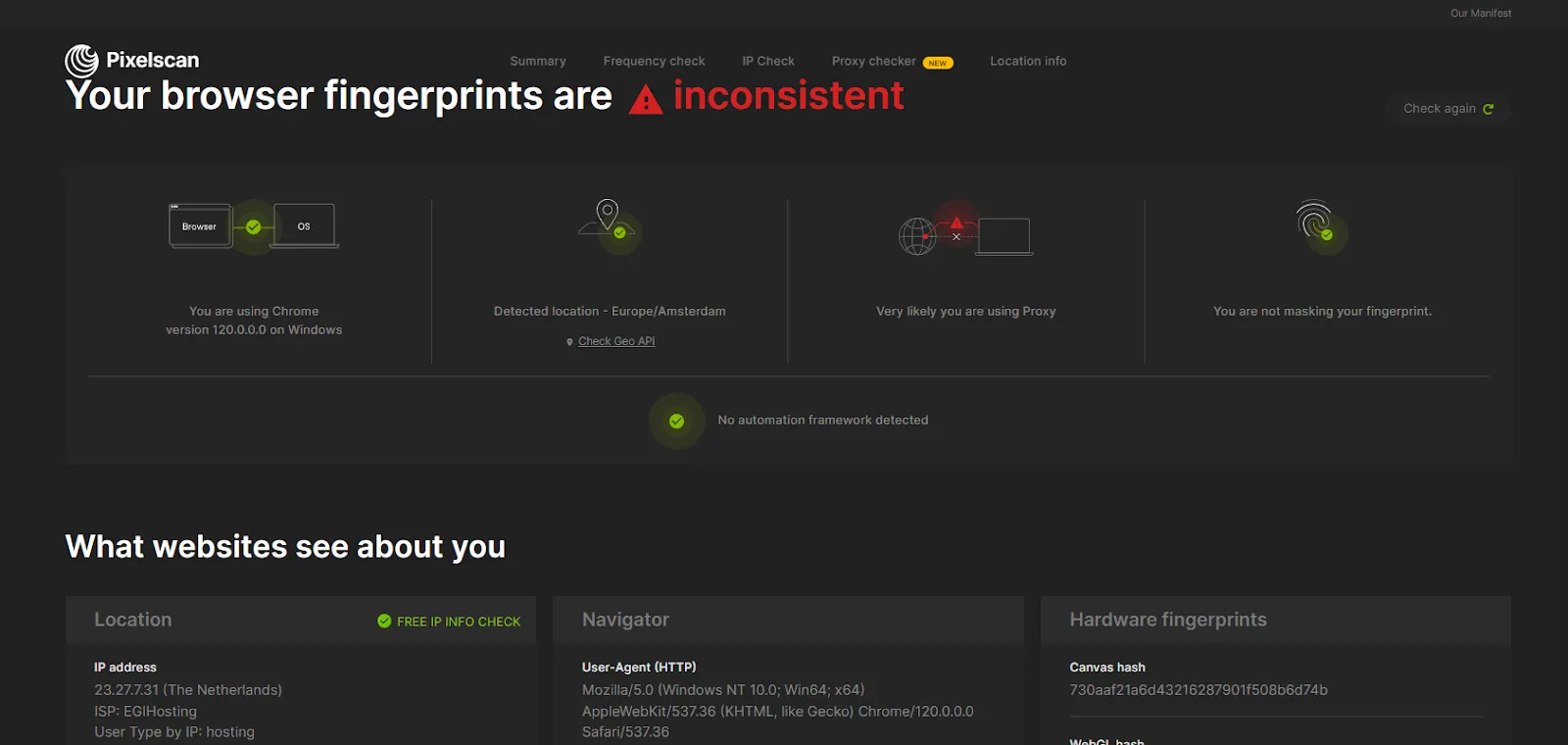
The situation with the IP is also better.
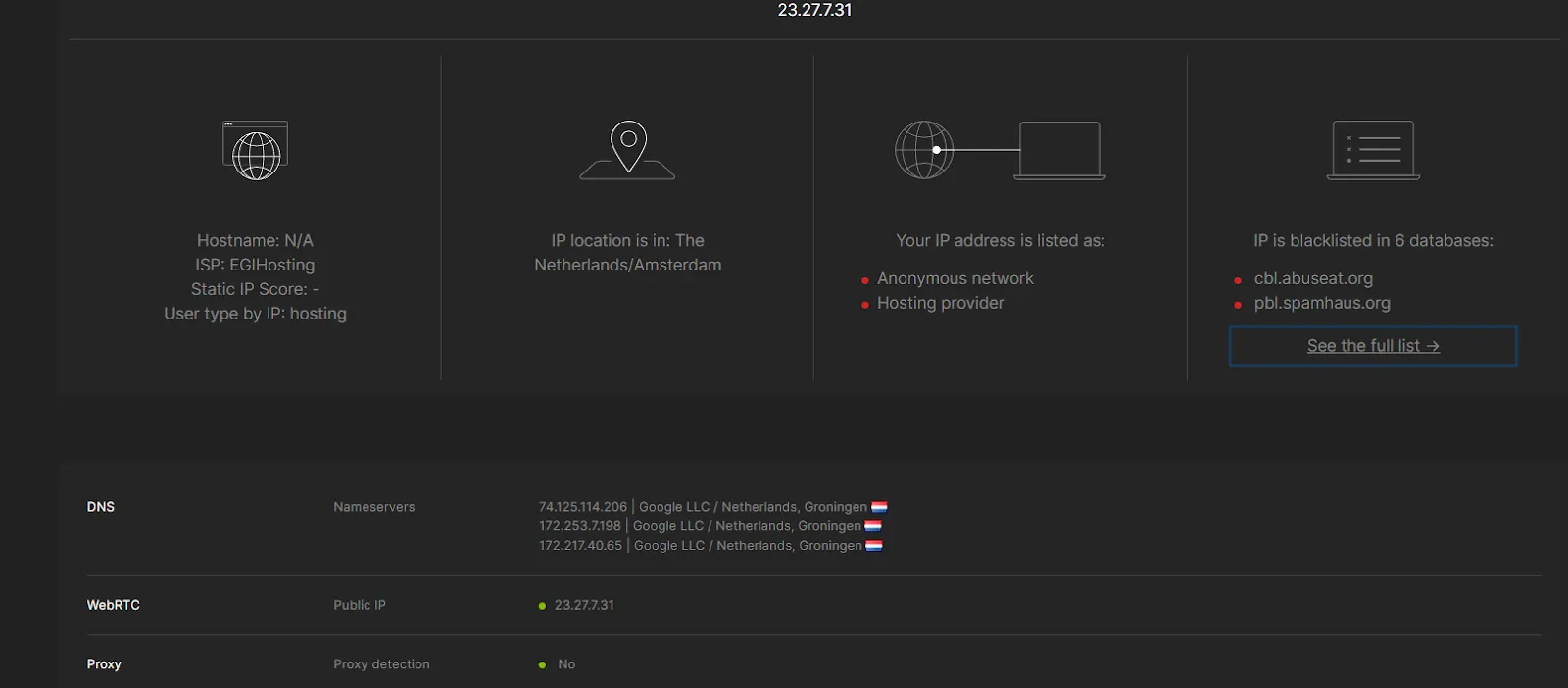
During registration, I’ve also used a clean number from the same GEO, linked the number, and put it on idle. The proxy performed well, and there were no issues observed during the account farming.
Astro proxy
The price is $3.6 with a 10% discount, 500MB, sufficient for email farming; residential with IP rotation. The GEO is Belarus, antidetect — Octo browser.
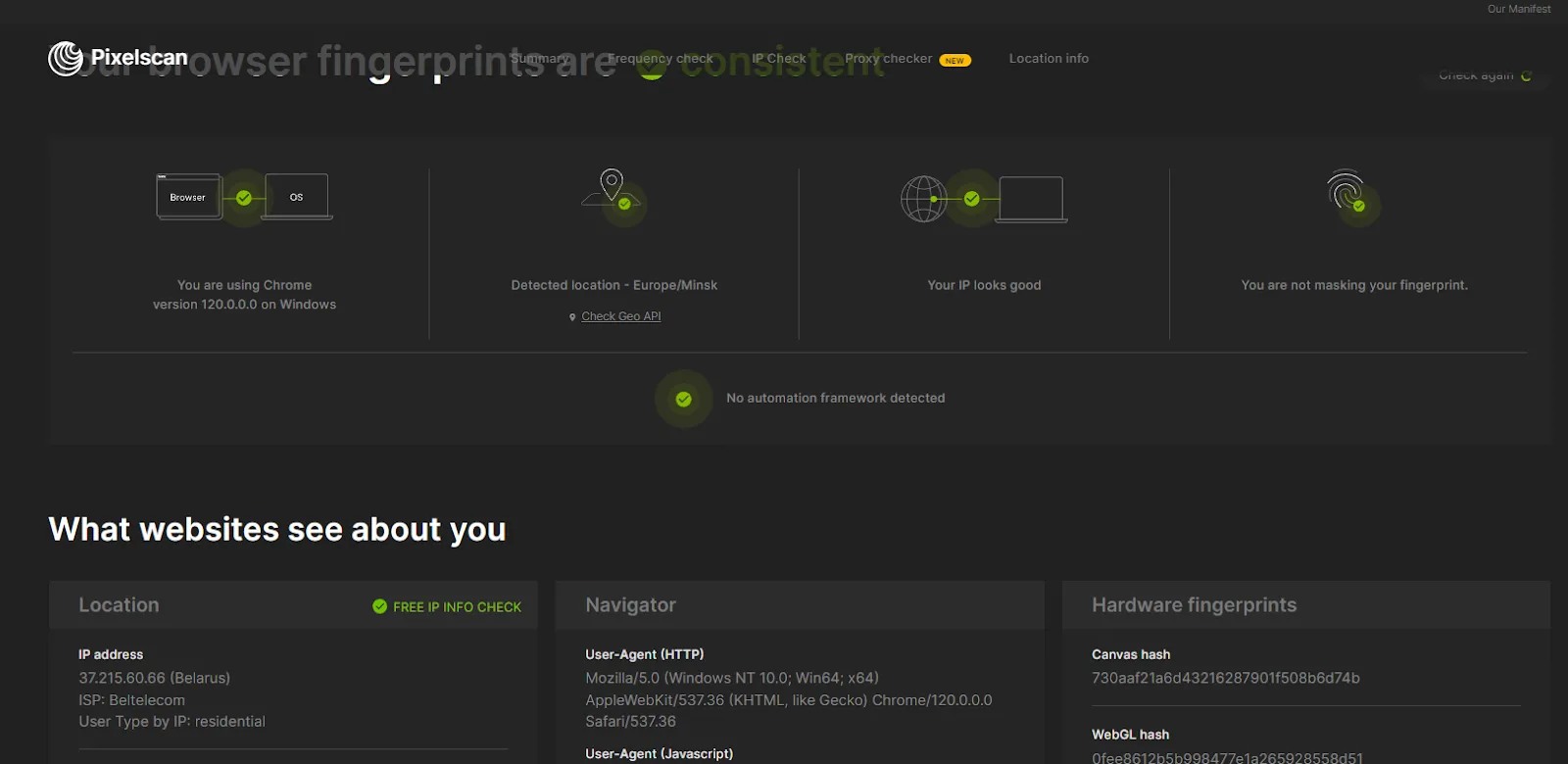
There are no issues with the fingerprint, and the proxy is residential.
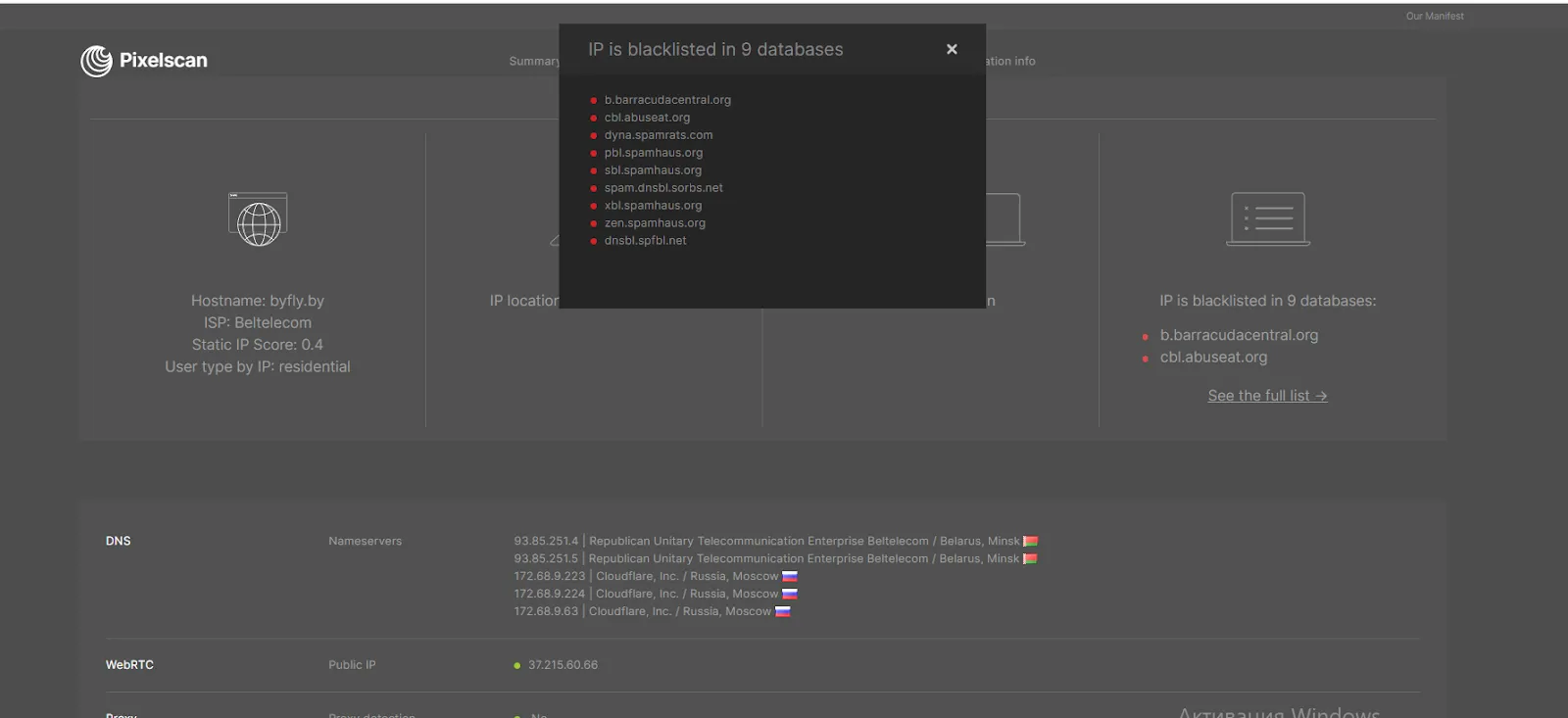
Regarding the IP, we observe DNS leakage and information about blacklists. In this service, there is an option to change IP on the proxy, it's unlimited, and you can catch proxies without blacklists. However, in this experiment, I won't be engaging in that since information in databases is updated with a delay, and the IP may not be in the blacklists. Plus, we create the account using clean sources, so there shouldn't be any suspicions.
During the account registration, it didn’t require a phone number, which is a good sign. The account was farmed for a week and then remained idle for another week. However, when using the account, there was a difficulty accessing payments.google.com. It requires confirming identity and sending a selfie to the proxy provider.
GEO — The Netherlands, using the Dolphin browser.
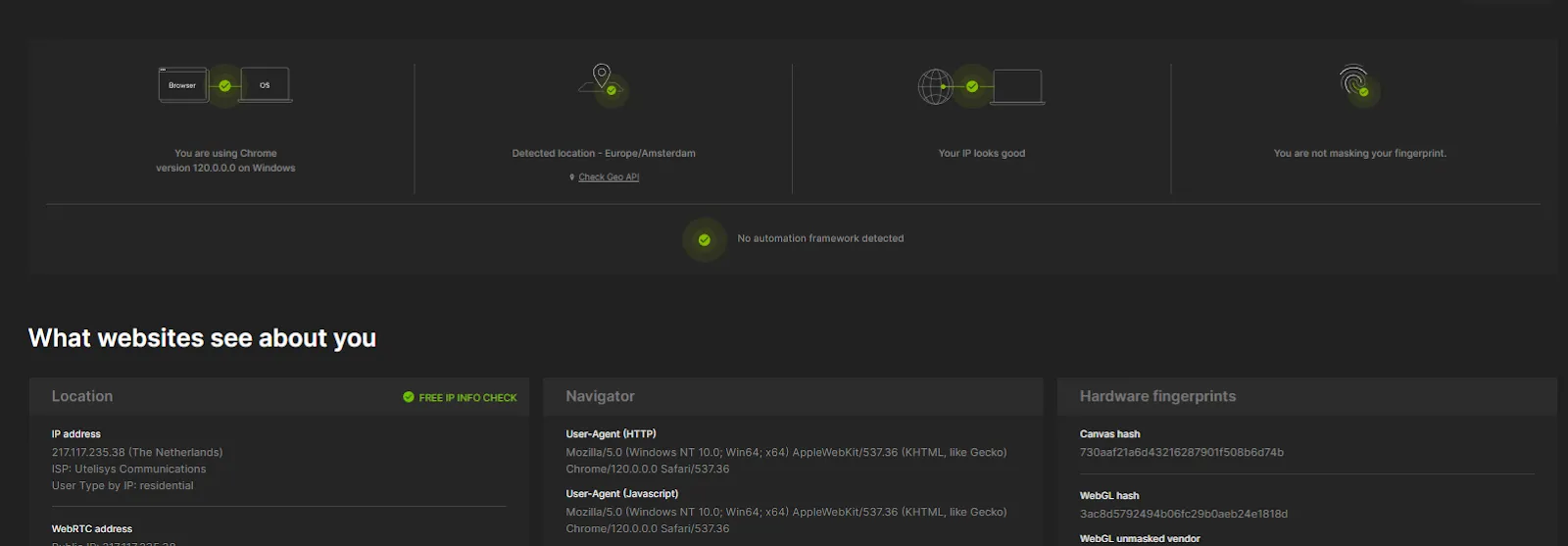
Farmed for a week and then lived in idle mode for another week.
LUNA PROXY
The price is $3, residential, unlimited, without IP rotation.
Account — the Netherlands, using the Dolphin browser.

No issues with the fingerprint.
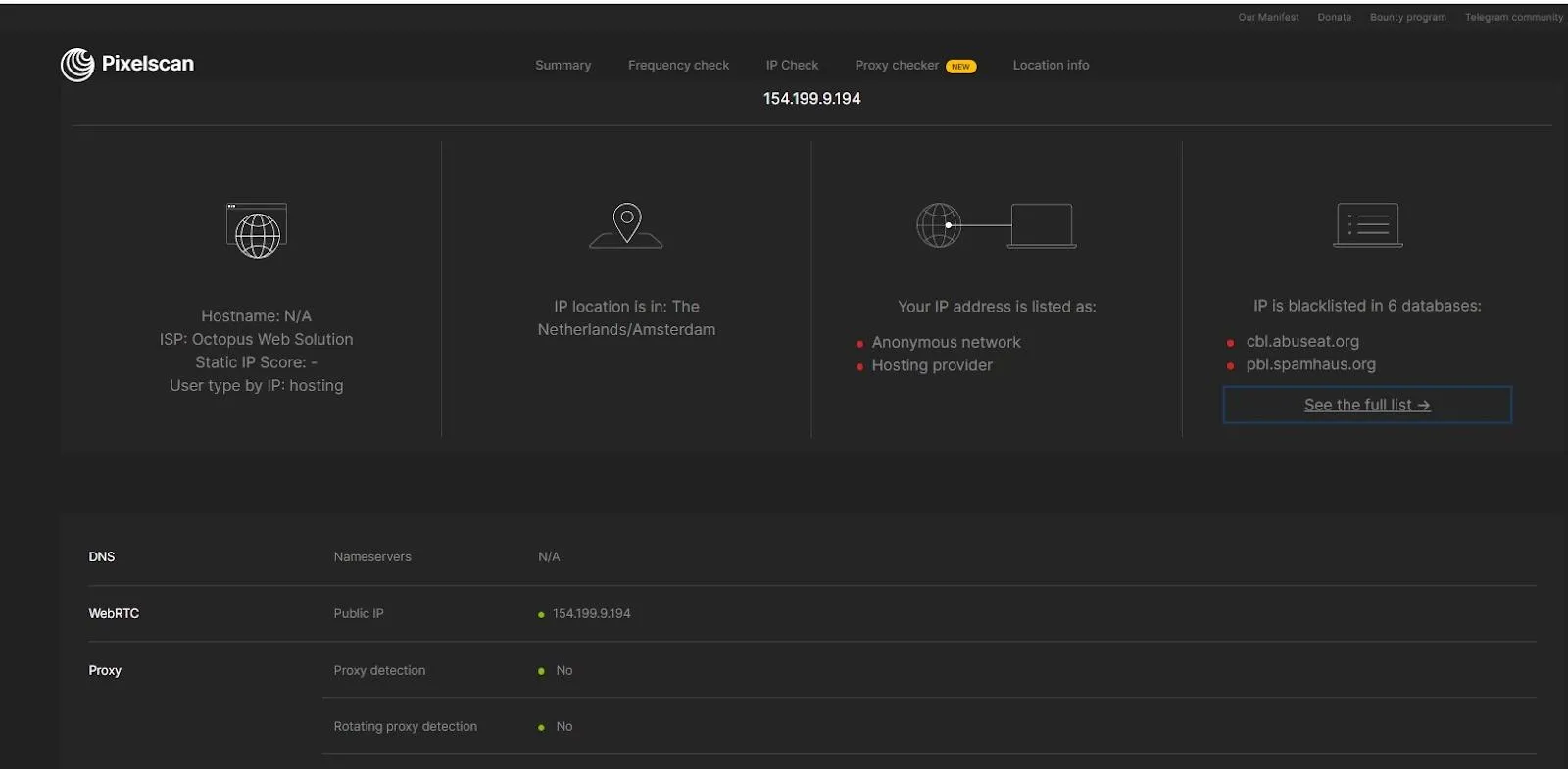
The IP seems suspicious, but there's no possibility to change it; let's see how it behaves in operation. Took the first step, linked the number, didn't encounter any issues during farming and using the account.
GEO Germany (no static proxies for Belarus), using the Octo browser.
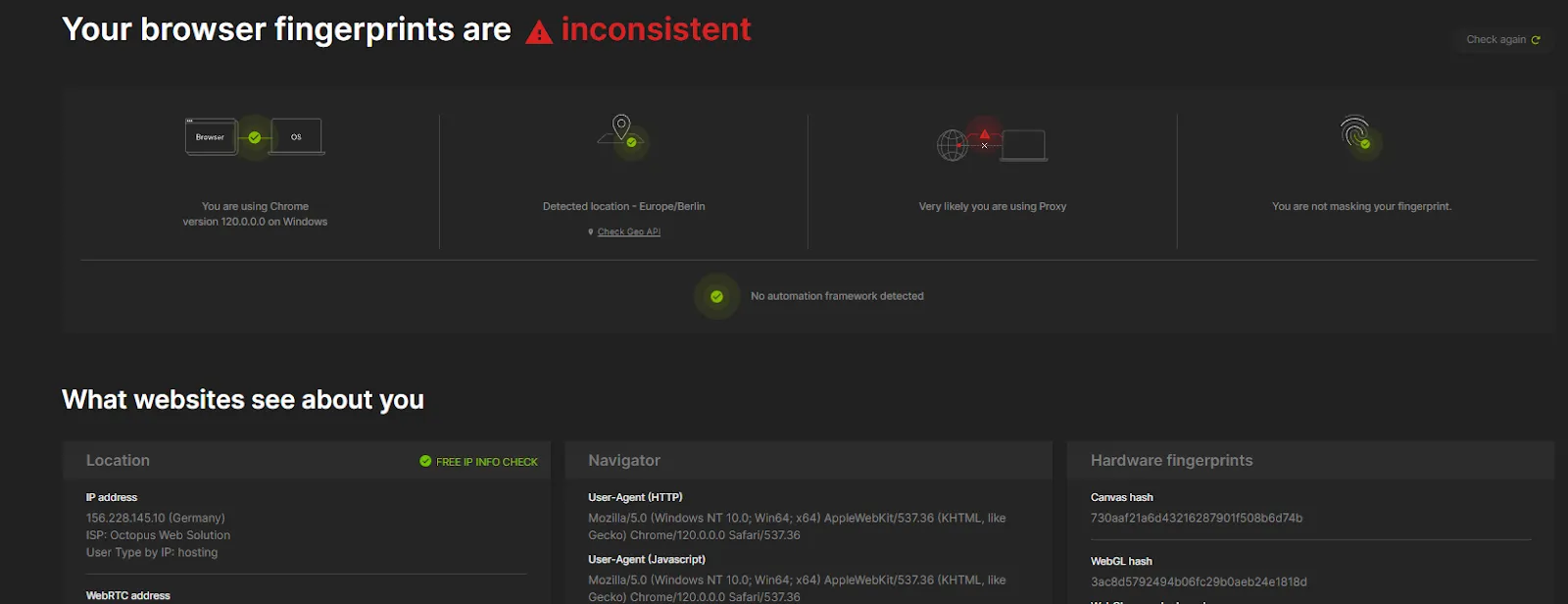
Although the service provides inaccurate information about the IP, I didn’t have any problems during account farming. I wouldn't recommend using these proxies for Google services. The proxies are perfect for bypassing blocks and everyday tasks.
Ake
The price is $3 per GB, no limitations on IP changes.
The GEO is Belarus, antidetect — Dolphin.
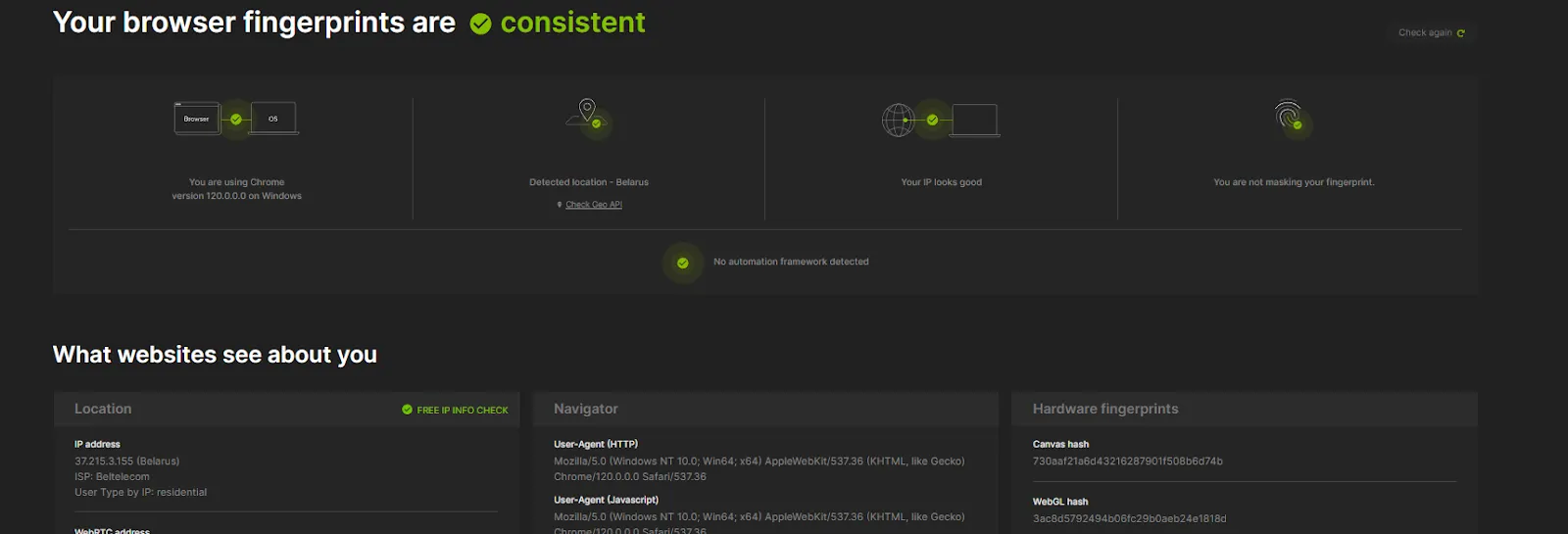
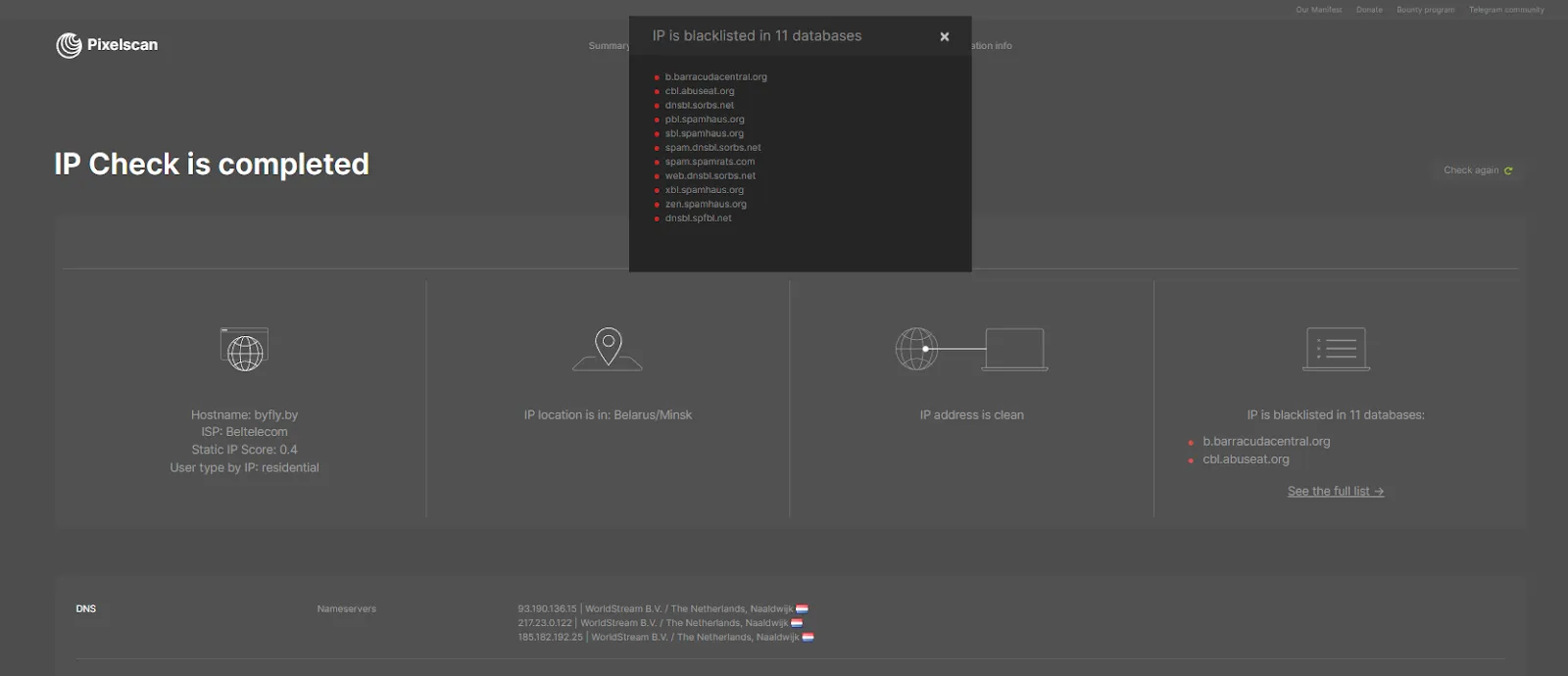
Registering an account for Belarus. It requires a phone number. After linking, it went into disable after 2 hours. I consider further use of this account with this proxy impractical. Took a new proxy for the same GEO, same story, received a disable 24 hours after registration.
GEO — the Netherlands:

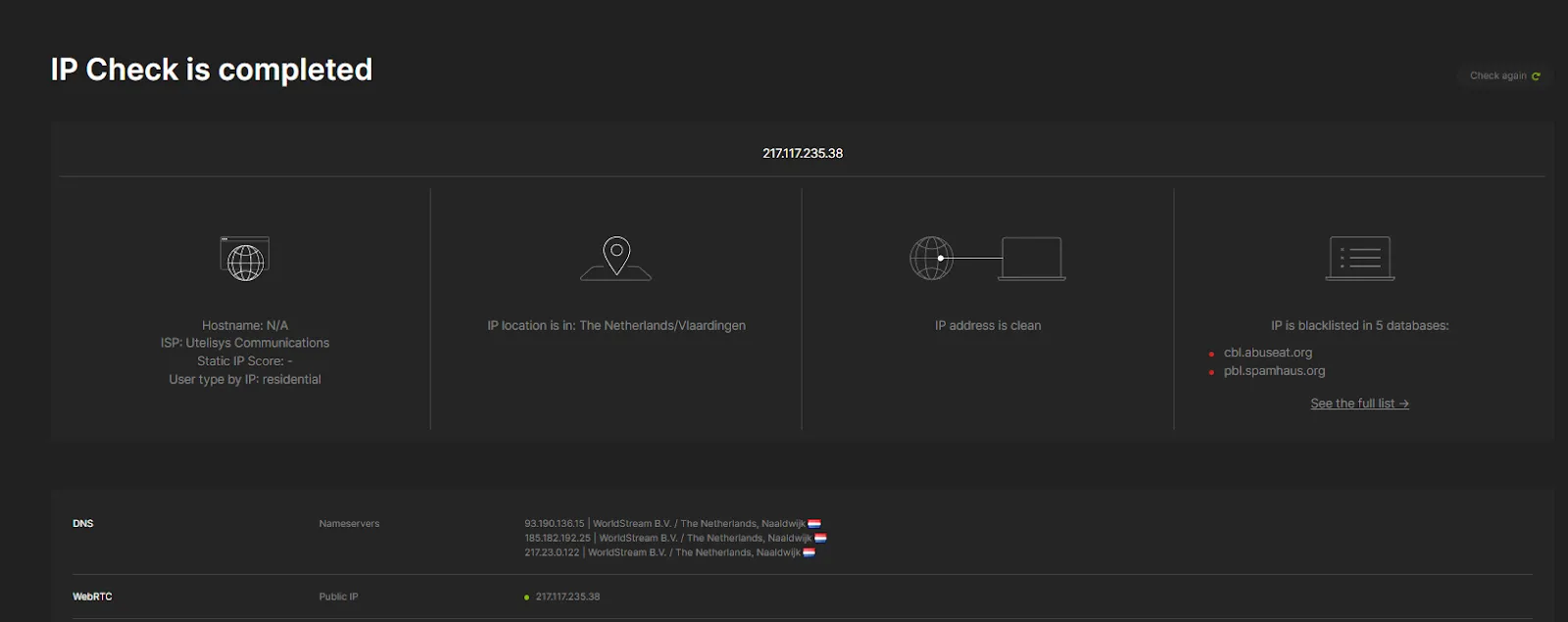
Proxies in this GEO seem better. I registered an account, went through a two-week farming period, and it's doing well. However, I faced an issue with proxy unavailability, which is likely due to me disabling rotation on unavailability.
Conclusion
Based on personal experience and test data, it can be concluded that residential proxies with unlimited traffic are more suitable for bypassing blocks and ensuring anonymity on the internet. It’s very challenging to find a quality proxy for under $5 that isn’t blacklisted and resembles the IP of a real user. On top of everything, if you need a large number of accounts, this type of proxy distribution will be more expensive.
If we consider services with payment based on consumed traffic, the situation is similar. It’s very difficult to find good IPs that are exclusive and come with a good history. These proxies are suitable for farming services such as YouTube and Gmail. If you intend to use your proxies for services like Google Ads or Google Play Console, I recommend, if possible, choosing clean IPs that only you will use.

by Editor



comments ....(0)
Leave a comment
You must be in to leave a comment